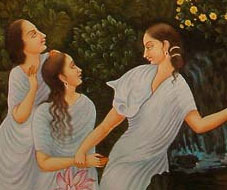|

Above:
Fragment of
Indian
painting
Commentary
Friendship: from Aristotle
to the present
Friendship has been a philosophical theme in the classics.
Aristotle considered it highly, placing friendship above love,
which he tends to depreciate and connect to eroticism.
For Aristotle,
friendship was an exercise between «equals», a virtue shared by
men belonging to the elite of Greek society. It had little of
brotherhood and solidarity, and involved a restraint, abstract
and utilitarian face («Between friends, the rule is that each
receives and returns in equal degree, or in a very similar one»,
Aristotle said).
To Aristotle,
friendship was also a somewhat egoistic issue: «Each man has in
himself his best friend, and, as a consequence, should love
himself above everything». Aristotle’s friendship was also
restraint: it didn’t include unknown people, foreigners or
women, who he considered «limited by nature».
We can, of
course, understand, or try to understand, Aristotle. We must
consider the period, and its preconceived opinions. And accept
that friendship, in its most current and broad sense can be
rather different from love or brotherhood.
Notwithstanding, just a few dozen years after Aristotle,
Epicurus established different and much more advanced concepts
of friendship. Epicurus inscribed friendship in a philosophy of
life where complicity, solidarity, sympathy or shared pleasure
were important elements.
Epicurus’s
friendship is much closer to the modern concept of friendship,
and was widely practised for centuries by the many epicurist
communities spread throughout the Roman empire, without the
exclusions conceived by Aristotle.
As with
everything that is human, friendship contains our ambivalence,
our contradictions. Friendship is often betrayed or crushed. It
is one of its contents. Anyway, friendship exists. We need it,
we create it, with different meanings and different demands.
In a broader
sense, friendship nowadays is equivalent to communication,
sympathy for the other, complicity, solidarity. In a current
vision, friendship doesn’t involve a deep and ideal
relationship, though our inner demands may place it well ahead
of circumstantial relationships and common circles of
acquaintances.
And we may, in
certain circumstances, think as Sartre, and say that «hell are
the others», or as Benjamin Franklin, that «there are three
faithful friends - an old wife, an old dog, and ready Money».
But, in their
very essence, arguments devaluing friendship are often the
reflexion of transitory moments of caustic and disenchanted
feelings about man and life; they do not nullify our persistent
demand for friendship and the importance and necessity we confer
in it.
Friendship is
as indispensable today as in the past. In a world such as ours,
with such a wide set of mercantile and abstract relationships,
space for friendship, with the existential enrichment it grants,
is essential to us.
We are beings
dependent on affections, dependent on the other, on fellowship,
on brotherhood, on solidarity, on sympathy. We don’t live only
by bread. Our “I” only exists and defines itself through others,
as their reflexion («If there isn’t other I, there is no I»,
said Tchuang-Tzu). Without the warmth of friendship and love,
life would be insupportable, Aristotle reminds us.
|